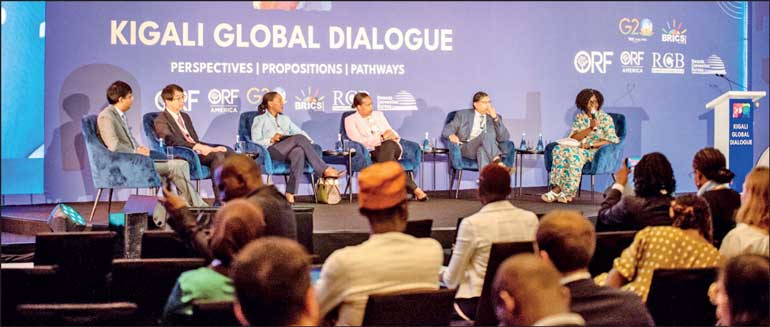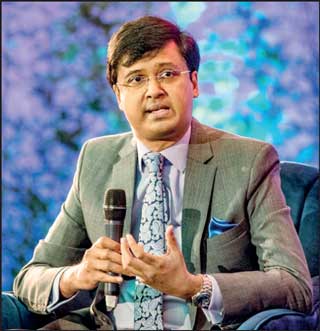Sunday Feb 22, 2026
Sunday Feb 22, 2026
Wednesday, 28 June 2023 00:10 - - {{hitsCtrl.values.hits}}

 |
| Rajeev Amarasuriya speaking at the Dialogue |
Attorney Rajeev Amarasuriya joined the Plenary Session on “Managing Debt and Looking at alternatives in Development Finance” at the 3rd Kigali Global Dialogue 2023 held in Kigali, Rwanda co-hosted by the Observer Research Foundation, ORF America, and the Rwanda Governance Board. This year’s dialogue was an official outreach event of the G20 under India’s Presidency.
The Kigali Global Dialogue brings together policymakers, academics, civil society, and the private sector from around the world to deliberate and devise solutions to critical sustainable development challenges facing the global community. The platform is unique because it brings together delegates and speakers from more than 70 countries, it amplifies perspectives from the across geographies.
Amarasuriya spoke on the vital role multilateral agencies play and the need for countries in financial distress to reach out to them early and that there was no room for experimenting in the present stressed and stretched ecosystem.
When looking at avenues of alternate debt, Amarasuriya stated that low and middle income countries in the global south were not seeing its full potential because some basics such as systems of good governance, accountability, being corruption free, consistent Government policies, and the ease of doing business are not adequately in place.
He also touched on the potential of diaspora funding and the need to build confidence in the diaspora to invest their monies in their motherland. In this respect, he proposed looking at the creation of independent agencies, either country specific or wider, to route diaspora funding, which would provide the necessary confidence to the diaspora.
Speaking in relation to debt, and some of the causes for the situation in Sri Lanka, he raised the issue of the need for lenders and borrowers to be more responsible. Whilst the multilateral agencies still follow the procedures and processes, he observed that there have been instances where bilateral and private lenders sometimes do not.
He mooted the proposition of developing an ecosystem where liability could also be imputed on the lender, and in this direction, proposed the formulation of International Best Practices for Lending and Borrowing by States and even an International Convention in this respect. It was his view that such practice must incorporate the principle that if a lender had recklessly lent knowing the project will not generate the requisite return or was destined to fail, then that the lender was also culpable and was responsible to take part of the liability in a situation of debt distress. He also flagged the concept of the responsibility of a nation towards the citizens of another nation, even within the lending eco space and drew relation to the Sustainable Development Goals and Resolutions of the United Nations General Assembly.
The other members of the Panel included Rwanda Development Bank CEO Kampeta Pitchette Sayinzoga, Ecobank Camaroon Managing Director Gwendoline Abunaw, Asian Development Bank Institute Dean and CEO Tetsushi Sonobe, Institute for Studies in Industrial Development (ISID) India Director Nagesh Kumar and the Session was moderated by Bill and Melinda Gates Foundation, Africa Program Advocacy and Communications Director Rachel Toku Appiah.